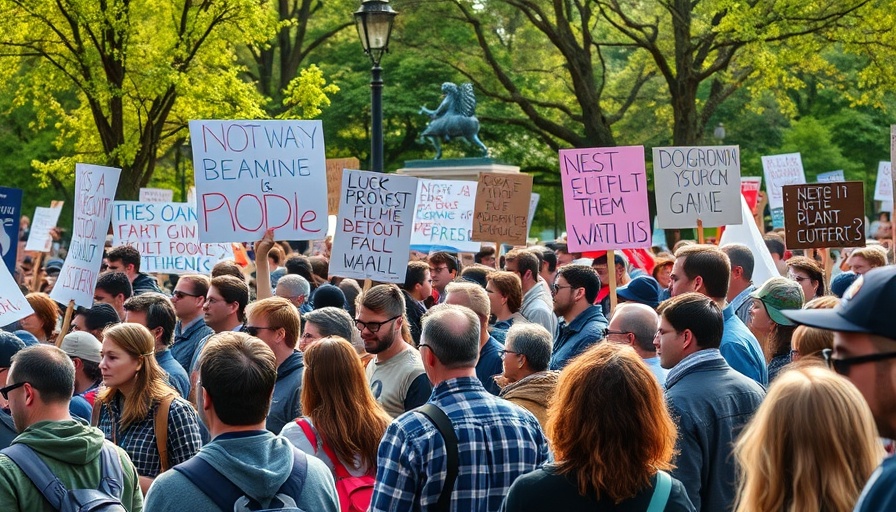
Amplifying Voices of Dissent: The Significance of San Antonio's No Kings Protest
As San Antonio gears up for the No Kings 2.0 protest scheduled for October 18, the anticipation is palpable. Head organizer of the local chapter 50501, Alex Svehla, spoke passionately about the event’s potential, stating, "This is a chance for everyone to unite under one cause and show the power of our voice.” With the previous protests having drawn millions worldwide, the upcoming march aims to spotlight the perceived authoritarianism of the Trump administration.
A Growing Movement: Nationwide Participation and Local Involvement
This year, San Antonio is joining over 2,500 locations across the globe in this demonstration. Participants will assemble at Travis Park from 4-6 p.m. for speeches, followed by a march at 5 p.m. The local chapter of 50501, alongside Indivisible and other organizations, emphasizes the importance of solidarity against what they view as a monarchical trend in governance under Trump.
The last major gathering, held in June, garnered estimates of between 3 million to 6 million participants, showcasing the power and reach of grassroots activism. In light of recent political tensions, the stakes for this protest are even higher, especially following discussions around government shutdowns and the targeting of immigrant families.
Contextualizing Protests: Domestic Policies and Their Impact
The No Kings movement originated as a backlash against Trump's immigration policies, which many perceive as cruel and authoritarian. With the government shutdown that began on October 1 adding urgency to the situation, protests have developed an increasingly focused agenda on defending the rights of federal workers and the immigrant community.
Political leaders and activists across Texas, including groups like the American Federation of Government Employees, are rallying individuals to voice concern against actions that they argue threaten due process and worker rights. This advocacy is not simply a local phenomenon; it's a part of a coordinated national response to perceived authoritarian governance.
The Crossroads of Art and Activism: Cultural Influences
The upcoming San Antonio protest is influenced by a vibrant culture of activism and artistic expression. Notably, Robert De Niro, a prominent actor, is among those lending his voice to this movement, likening the struggle against Trump’s policies to the revolutionary spirit of the American Revolution, referring to it as the "original No Kings.” This kind of cultural endorsement highlights the intertwining of the arts and political activism in contemporary society, creating a unique platform for dialogue and engagement.
Moreover, protests are often marked by creative displays — from music performances to theatrical expressions — integrating a sense of community and unity among participants. These artistic elements serve as a powerful reminder of the enduring fight for democracy.
Local Businesses: The Indirect Impacts of Political Movements
The San Antonio local economy also feels the effects of such protests. Businesses, particularly small and minority-owned ones, often find their fortunes tied to the political climate. The mobilization around the No Kings protest underscores a wider cultural urgency that could impact economic decision-making, especially in sectors like hospitality and retail.
Local entrepreneurs are finding their voices amplified through campaigning for both visibility and support within the community. This form of civic engagement interlinks economic growth with social responsibility, illustrating how activism may lead to new opportunities in business and community networking.
Future Predictions: The Road Ahead for Activism in America
The prevalent success of these protests could foster a long-term movement advocating for democracy and equality. Experts suggest that participation in protests like No Kings can reshape the political landscape, influencing not only local governance but also federal policies moving forward. With an active civic responsibility taken up by younger generations, the landscape of activism may transform, potentially marking this period as a resurgence of grassroots engagement in American politics.
As San Antonio prepares for this historic day, it’s important to remember that each march represents more than a moment—it signifies a collective demand for accountability and reform for future generations.
While the eyes of the nation will be watching on October 18, local businesses and communities will continue to feel the ripples of these movements, reinforcing the need for solidarity, advocacy, and active participation in shaping the future.
 Add Element
Add Element  Add Row
Add Row 



Write A Comment